Learn how to become a social media manager in our complete guide, from training to finding your first clients and growing your brand.
Key takeaways
- Building your own social media following demonstrates your skills and credibility to potential clients.
- Social media managers combine creativity, strategy, and analytics to grow brands and drive business results.
- Freelance social media managers can earn $15-100+ per hour depending on experience and specialization.
Being active on social media is not just an option for businesses—it’s non-negotiable. Engaging an audience on social media is an essential part of building a brand. For those who get it right, the benefits are endless.
The problem is that with so much noise out there, getting noticed is no easy task. Keeping up with trends, writing snappy copy, and creating visual media takes time. The job often requires resources and experience that most business owners don’t have.
And so, the social media manager role was born. But what exactly do they do? And how can you build a career in this field?
Here’s what you need to know about becoming a social media manager—from equipment to internships and beyond.
What Is Social Media Management?
First, let’s explore why social media marketing is a vital part of any business’s commercial strategy. Managed successfully, social media marketing will:
- Build brand awareness
- Deepen customer relationships
- Increase customer trust
- Boost PR
- Simplify customer and prospect communications
- Provide insights and data to inform strategy
- Generate leads
- Increase revenue
All these benefits aren’t guaranteed, of course. Successful social media management will look different for each business or brand. The key is understanding the entity’s commercial objectives and target audience.
Social media management requires a working knowledge of various social media platforms. Today, the leading platforms are Facebook, X, Instagram, LinkedIn, YouTube, and TikTok. But social media platforms and technology move on quickly. In a matter of months, that list could look quite different.
The most successful brands on social media will:
- Have a strategy
- Plan content
- Publish consistently
- Respond to trends and news
- Listen to and engage with prospects, customers, and other brands (including competitors)
- Track performance in analytics
- Use paid advertising
It’s no mean feat, as it requires expertise, time, and creativity. That’s where a social media manager comes in.
What Is a Social Media Manager?
A social media manager handles an entity's social media accounts, from creating and scheduling posts to replying to comments and monitoring engagement.
On the surface, a social media manager’s role might seem simple. But it’s a more complex and varied role than you might think. Effective social media managers solidify brand identity and engage their target audience.
What does a social media manager do?
On a typical day, a social media manager might:
Strategize 🤔
Social media managers craft strategies aligned with a brand's commercial objectives. This includes maintaining visual design, tone, and messaging.
They also need to identify which social media channels to use, and the best days and times to publish content for maximum impact.
Design, create, and post content 🎨
Social media managers may also be responsible for designing and creating content that will be posted. This might include writing copy or image captions, graphic design, or even filming and editing videos.
Canva is a great design tool for social media creators, with plenty of templates and inspiration. It’s handy that there’s both a free and paid version, so you can have a play before you sign up.
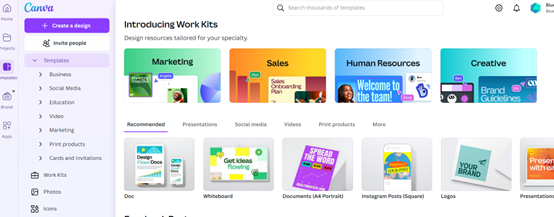
Analyze data 📈
Using analytics tools, a social media manager will track and measure social media engagement. Findings will direct future content and campaigns, so that time and effort are put into the areas most likely to deliver results.
Report on performance 📃
The social media manager will typically present performance reports to show the impact of their campaigns.
Engage with/respond to the audience 🗣️
If a social media manager is working alone, they may be responding to messages or comments on social channels. If they are managing a team, they may be supervising others doing this.
Track trends and competitor activity 👌
Social media trends and algorithms are evolving constantly. Social media managers need to stay up to date.
Manage relationships with influencers, sponsors, and affiliates ❤️
A social media manager might collaborate with influencers or sponsors to maximize reach.
Build and manage communities 🙌
Many businesses use platforms like Whop to create online communities for sharing content and deepening customer relationships. Community management can come under a social media manager’s remit, so it’s worth doing some research into community platforms.
- Best Online Community Platforms of 2024 (Free and Paid)
- How to market yourself on social media and grow your brand
What equipment do you need to be a social media manager?
The beauty of being a social media manager is that all you really need is a workspace, a computer, and a strong internet connection. You might also want to invest in a webcam, headphones, microphone, and video conferencing software.
This will help you to meet with your clients and/or collaborate with others. If you choose to build a community on Whop, you can also host video calls, for example.
Oh, and you’ll need some social media management apps.
“Social media management apps?”
Apps and software can make managing social media quicker and easier. They are particularly useful if you are working across lots of brands. The leading social media management apps include Buffer, Hootsuite, and Sprout Social.
Most will offer free trials before you sign up for a package, so it’s worth trying a few before you commit.
Buffer
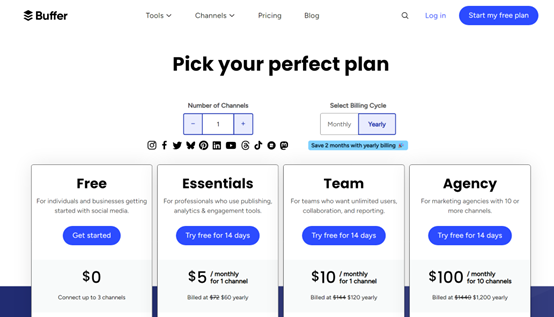
Buffer is a social media management app for independent freelancers and businesses with large marketing teams. Key features include tailored scheduling, a social media calendar, and an AI assistant to help you create content. Buffer also integrates with DropBox, Canva, and other tools.
Hootsuite

Hootsuite is one of the better-known social media management tools. One of its big benefits is the way it enables easy collaboration. Plus, it boosts the quality of your content through AI and writing tools.
Sprout Social
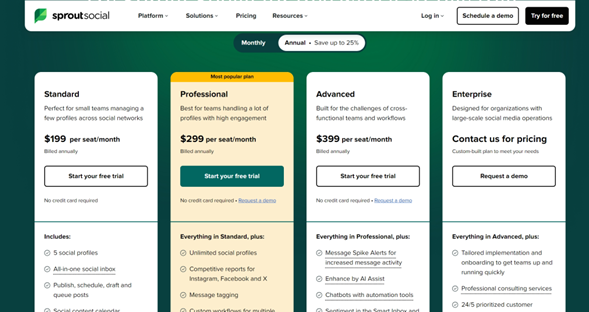
Sprout Social is a platform with lots of features for large teams. But there’s plenty for a solo social media manager to enjoy too, including a dynamic social media calendar.
Where do social media managers work?
A social media manager could be employed in-house by a business, individual, charity, or organization in any sector. Alternatively, a marketing agency or PR firm might employ social media managers to work with their clients.
But if you’ve landed on this article, there’s a good chance you’re thinking with a bit more ambition. As a freelance or self-employed social media manager, you can choose which brands or individuals you want to work with, along with when you work, how much you work, and how much you charge.
Of course, being self-employed comes with its own challenges. You will need to be proactive to build up a client base, stay prepared to manage your own finances, keep on top of marketing, and be hyper-organized.

- Best Side Hustle Ideas to Make Money in 2024 by Lizzie Davey
How much does a social media manager make?
As with any career, your salary will vary depending on the country you work in and your level of experience. If you are employed by a company, your salary will also be impacted by their industry.

According to Indeed.com, the average salary for a social media manager in the US is $58,534. Salaries can range from approximately $34,000 to $90,000 for the most experienced candidates.
How much should a freelance social media manager charge?
Of course, if you choose to work on a freelance basis, you can set your own fees. The amount you charge will depend on your experience level and niche, along with any particular specialisms you offer.
If you’re just starting, you’ll typically charge between $15 and $50 per hour. But social media managers with several years of experience can charge upwards of $100 per hour.
Some social media managers prefer to charge a monthly rate or a fixed fee for a set number of posts they create and schedule.
How to Become a Social Media Manager
So, you’re ready to build your own business as a social media manager. But where do you start? Here are some ideas to kickstart your journey.
Take a social media management course
Universities throughout the country, and even your local college, may offer courses in digital marketing and/or social media. Other subjects like media, communications, English, sociology, or psychology can also be useful areas of study for aspiring social media managers.
However, you don’t necessarily need to leave the comfort of your home to study for a qualification in social media management.
There are plenty of online courses out there that let you study at your own pace and even specialize in particular niches or industries. You’ll need to consider the costs involved, as well as the need to balance studies with paid employment.

Want relaxed social media training you can get stuck into? There are some great courses right here on Whop, created specifically to help budding content creators maximize their income, including Social Army Academy and Media Metas.
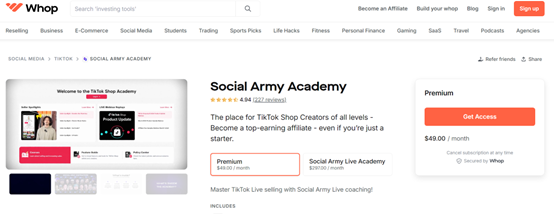
Develop an online following
An alternative route into a career in social media management is to…start managing some social media!
There’s nothing quite like real-life experience, and nothing is stopping you from building your own following on social media. Choose a topic or industry you are passionate about, start posting content, and build up your network.
Growing a strong social media profile shows potential clients and employers that you understand online marketing and have the follower count to prove it. Plus, it doesn’t have to stop with social media. Why not create a search-engine-optimized blog to share your insights into the world of social media?
A successful social media manager combines their digital skills with analysis, human insight, and a big dose of creativity. It’s a varied and fast-paced career that requires:
- Copywriting
- Graphic design
- Video production and editing
- Time management
- Understanding of marketing principles
- Insight into human psychology
- Skills in data analysis
- Community building
- Leadership and the ability to influence/champion ideas
If you’re honest with yourself, there are probably gaps in your skillset and/or areas where you can improve. From writing snappy copy to crafting viral video content, the only way to get better is to practice.
Think of it as a trial-and-error experiment. Try out some different techniques and approaches to see which generates more engagement.
Will you be working with B2C (business-to-consumer) or B2B (business-to-business) clients? You might work with both, but either way, you’ll need to publish content on the right channels to maximize ROI.
A good place to start is the giant that is Facebook. In August 2024, Facebook had a 60.8% share of the global social media market, with 3.07 billion users worldwide.

Spend time scrolling through different social media platforms to see what kind of content is the most popular, what are the trends, and who are the top influencers.
All social media platforms use algorithms, which are evolving all the time. A big part of your job will be keeping up to date with best practices for these algorithms.
Start using analysis and management tools to ensure you can do your job efficiently. Most will offer some free trials so you can explore their functionality. You won’t be an expert on every social media platform, so it’s a good idea to pick one or two to focus on initially.
Get a social media internship
Aside from building your own following, another option is to try and secure an internship in a company. Alternatively, you could volunteer to manage the social media of a charity or sports team.
Keep in mind that most social media internships are unpaid. You’ll typically cover a few hours per day or week, and gain experience through the role. It can be worth it, though. Once the internship is complete, the organization may offer you a full-time role. Even if they don’t, they’ll usually provide a testimonial to boost your reputation.
If you’re very lucky, you might find a paid internship. These are typically on a low wage but can help to sustain your finances as you grow your profile. In some countries, you can also apply for social media apprenticeships, where you’ll work part-time and study part-time. Again, you’ll be on a lower wage, but your study will be provided.
Check out Indeed, LinkedIn, Glassdoor, and other employment websites to look for internship vacancies.
Try out freelancing websites…
Aside from internships, there are also plenty of freelancing websites to showcase your social media skills. These include Upwork, Fiverr, PeoplePerHour, and more. Here you can advertise your services as a social media manager, and clients can approach you for work. You can also apply to freelance jobs they post on the site.
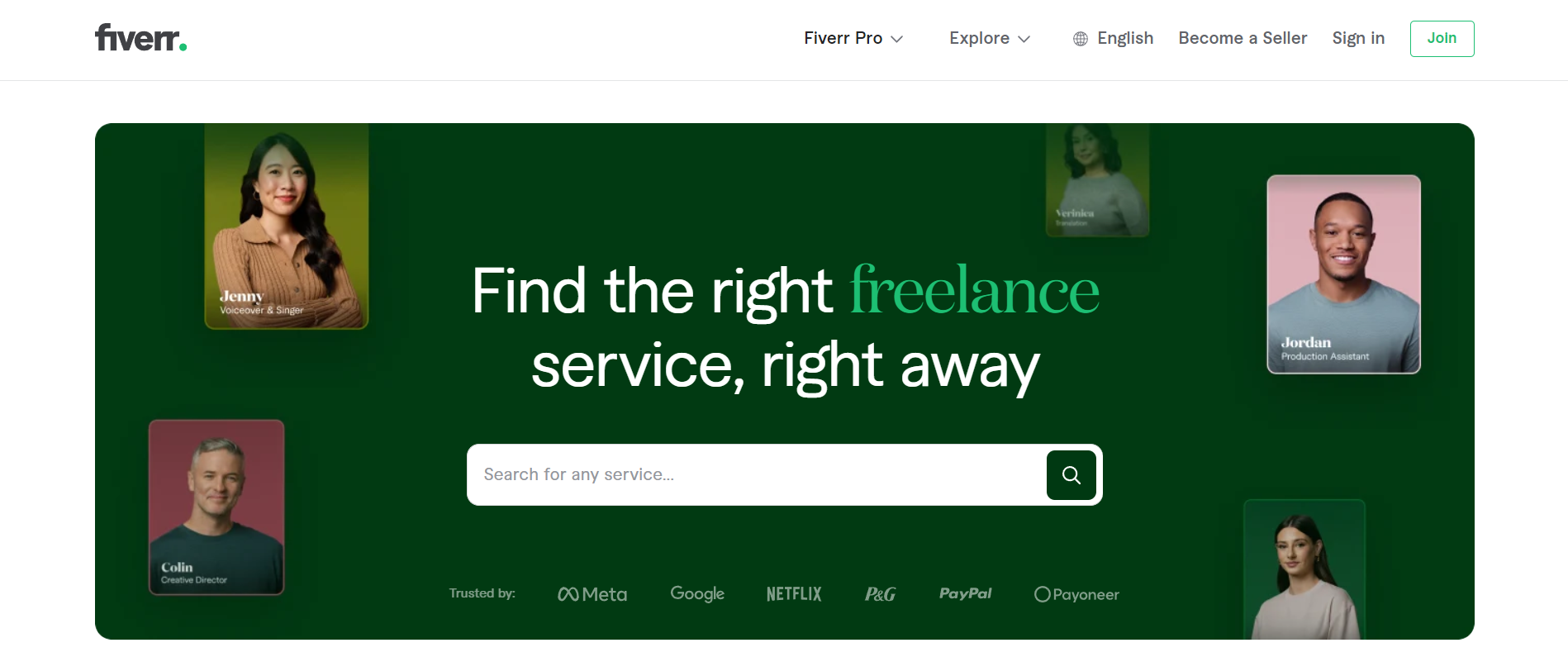
Even if you’re starting out as a beginner, this can be a good way to grow your profile. You’ll typically need to start at a lower rate as you build a reputation on the platform. When you gain more knowledge, you can increase your prices.
This is a great way to gain experience, as you’ll be paid as you develop your skills. These websites can be competitive, though. They also come with additional costs, as they usually take a commission from your earnings.
Or build your own website!
If you don’t want to compete for clients and are looking for more control over your earnings, building your own website is a great solution. Even if you’re not a web developer, there are plenty of easy website builders you can use. These include WordPress, Squarespace, and more.

Again, you’ll need to factor in the costs for a website. These include expenses for your domain, website builder plan, and other features, like email marketing and payment processing.
Build a portfolio and track analytics
Building a portfolio of successful content and campaigns can really help you to win over a potential client. An online portfolio will showcase your qualifications, experience, and skills. You can also present client testimonials and samples of your content.
So, as you gain new clients and work on projects, make sure to keep records of your success. Take screenshots of your managed Instagram feeds and the Facebook posts you’ve crafted.
Most importantly, record your clients’ social media analytics. Key metrics to record include follower count, engagement rate, click-through rate, conversion rate, and more. Potential clients want to see what your social media management can achieve for their business.
With the right social media analytics in place, you can show people how your strategies and campaigns have engaged and grown an audience. Having these tangible results to hand can make a huge difference.
Typically, social platforms will have their own analytics tools. You can also use specialist social media analytics tools to gain more data, including those on Buffer and similar apps.
Grow industry connections
As it sounds, social media marketing is social by nature. Remember to network with other social media and online marketing professionals who can offer guidance and support. You may find they send clients your way when they have an overflow—and you can do the same for them.
They might also consult you if you specialize in a particular marketing platform or niche. For example, a search engine optimization (SEO) manager might want to link up with you to manage their client’s TikTok account.
Plus, don’t forget to reach out to some influencers in your chosen niche. Content collaborations can be incredibly powerful when done in the right way. Through establishing connections with influencers, you could reach a whole new audience.
Specialize your marketing skills
From paid ads to organic marketing, X to Instagram, social media has many facets. As you continue to grow your brand, you might decide to specialize in a specific niche. While you might be tempted to cast your net as wide as possible, that’s not always the best choice.
Here’s why.
Think how many social media managers there are in the world. It’s a big number. According to data from Revelio Labs, there were 64,000+ in the US alone by April 2022. The market is saturated. But how many “organic Facebook and Instagram marketing managers for Fintech brands” are there? The number is likely to reduce considerably.
By tailoring to a niche, you make it clear to potential clients exactly what you offer. You also show your expertise. Anyone can spread themselves too thinly across all platforms and industries. But by specializing, you tell clients you’re an expert in your field.
Make sure your portfolio reflects your niche. If you want to specialize in fashion marketing, your portfolio shouldn’t just have food and drink marketing accounts. Don’t have the experience you want? You can always apply to internships and beginner freelance jobs in your dream niche.
Share your expertise
Once you’ve established your reputation in the social media world, you can branch out further. Why not share your know-how with the next generation of marketing managers? Or give cash-strapped brands the knowledge to grow their own accounts?
Create an online community to share your experience and provide advice to aspiring marketers. There are lots of platforms to start this on, including Whop, Facebook groups, Discord servers, and forums.

Some platforms even allow you to monetize your online community. You can set different membership tiers. So, for example, you can offer a free, public plan and a paid, exclusive plan with extra features.
As your community grows, members will form a connection with you—and many will want to hire you to manage their own campaigns.
Social Media Management: To Study or Not to Study?
There is a stereotype that just about anyone can become a social media manager if they use social media in their personal lives. But is that true?
On the one hand, it’s not always essential to have a degree or certification in marketing or a related field. Plenty of people have built successful careers in social media without formal qualifications.
But, if you’re looking to speed up your career and/or give prospective clients confidence in your skills, a degree or certification in social media, performance PR, or digital marketing could help.
Ultimately, it depends on your needs and preferences. Training in social media can provide you with a step on the ladder. But there’s no substitute for real experience. You’ll typically still need to gain experience promoting your own social profiles or other businesses before brands start to trust you.
Beyond this, degrees and courses in other specialist subjects can help you to hone your career. So, don’t worry too much if you have a degree in another subject.
For example, a degree in a foreign language could broaden your horizons for the types of social media accounts you can manage. Many companies are looking for bilingual marketers, for example. Technical knowledge in engineering, computing, and health can also help you to specialize in different niches.
Promoting and Growing Your Brand
With some experience and knowledge behind you, you can start to build your own personal brand on social media. As explored above, there are several ways to do this, including:
- Connecting with other social media professionals and influencers
- Creating and joining online communities to share knowledge
- Collating an online portfolio of your successful content and campaigns
- Developing a search-engine-optimized social media blog
Another great way to attract potential clients is to run courses in social media marketing that brands can pay to access. You can set this up easily on a platform like Whop. The courses will showcase your expertise and can even promote your services.

You can then upsell more services while nurturing and managing client relationships. For example, some students may want 1-to-1 support, which you can offer through coaching sessions. These are simple to present online through video calls, and you can schedule and charge for these sessions on Whop.
Create Your Social Media Management Business With Whop

Ready to get started on your new business venture? If you’re still not sure where to start, don’t worry. On Whop, you’ll find in-depth courses, communities, and more from leading social media managers. They’ll guide you through the ins and outs of setting up your marketing business—from branding to finding clients and accepting payments.
Plus, you can connect with other aspiring social media gurus and experts in the field. Many also provide access to job boards, 1-to-1 coaching, and more. With Whop, you can gain the skills and experience you need to be your own boss. That gives you the freedom to work where and when you want to.
So, what are you waiting for? Check out the marketplace to find your whop and get started on your marketing empire.



